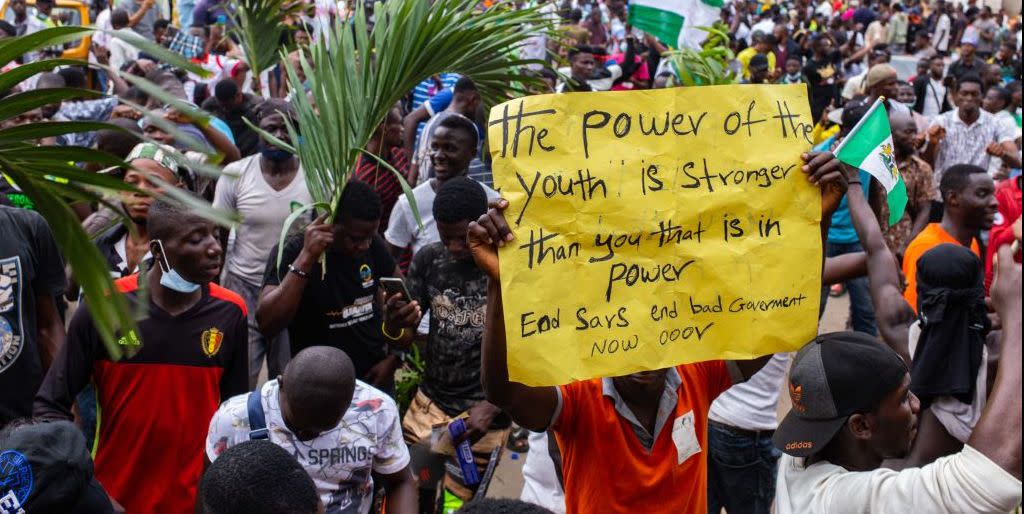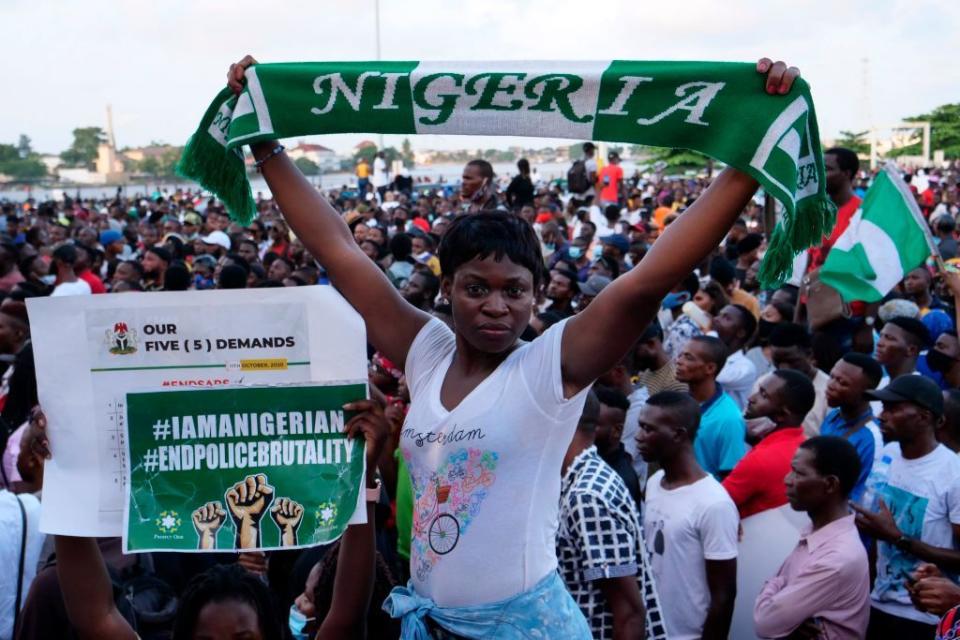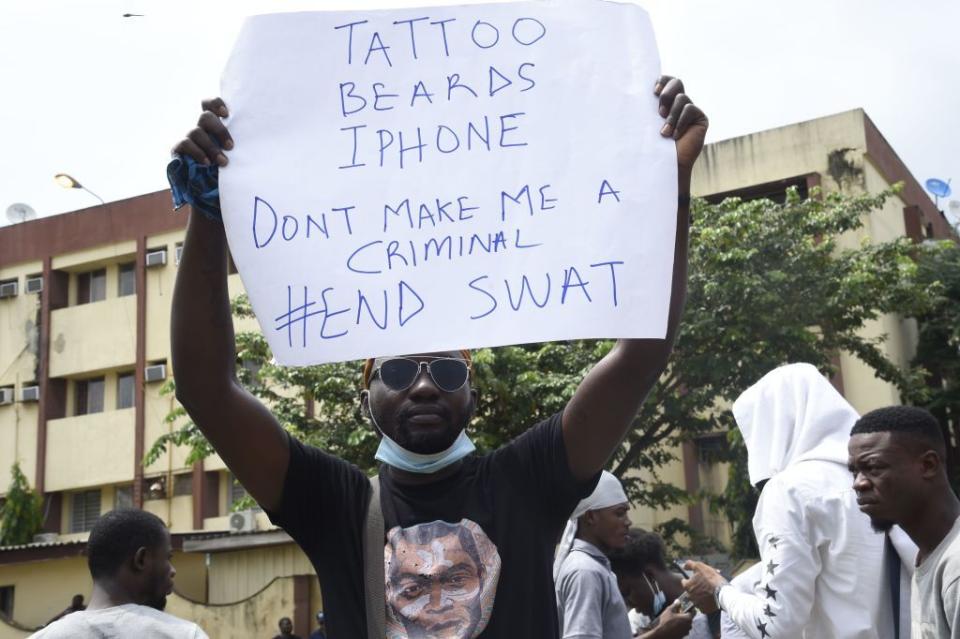How You Can Help the #EndSARS Protestestors in Nigeria

Widespread protests against police brutality–specifically against a controversial police unit called the Special Anti-Robbery Squad (SARS)–have been taking place in Nigeria this month.
SARS was founded in Nigeria in 1992, and since then has faced numerous complaints about violent and extrajudicial actions.
The response to the protests has turned violent, and on October 20, peaceful demonstrators were shot, with reports suggesting that as many as 12 people were killed.
2020 has been a year of pivotal, urgent protest against police brutality in the U.S. Now, the world's eyes are fixed on Nigeria as citizens rally for reform and face retaliatory violence. In recent weeks, people have taken to the streets to demand the end of the Special Anti-Robbery Squad (SARS), a wing of the Nigerian Police Force that has been accused of numerous illegal acts including killings, robbery, and kidnapping.
Led by the country's youth, the protests are a response to years of alleged abuse and brutality by the Nigerian police, and a lack of meaningful reform efforts by the government, which has been promising for years to end SARS, the New York Times reports. According to a report released from Amnesty International in June, SARS has been responsible for "at least 82 cases of torture, ill treatment, and extra-judicial execution" in a stretch of a just over three years, primarily targeting young, poor men. This targeting is reminiscent of police brutality in the United States, which has led to protests in the name of George Floyd, Breonna Taylor, and other Black Americans killed by police.
After more than a week of intense, nationwide protests, the demonstrations were met with violence by security forces, who opened fire on protestors in Lagos, reportedly killing up to 12 civilians. People across the globe have since drawn their attention to the #EndSARS movement to learn about the controversial department's laundry list of accusations.
Below, you can find an explanation of what's currently taking place in Nigeria, the years of police brutality that led to this moment, and what you can do to help those fighting for change.
The #EndSARS movement began back in 2017.
But in a matter of a few weeks, the hashtag #EndSARS has been shared worldwide in October 2020, including by celebrities like Beyoncé, Rihanna, Lil Nas X, and Nigerian superstar Burna Boy. But the hashtag's origins and widespread use actually date back to 2017.
#ENDSARS 🇳🇬 pic.twitter.com/59lrs8JnDA
— Rihanna (@rihanna) October 20, 2020
The Special Anti-Robbery Squad itself has existed since 1992 with the intention of combatting violent crime. In the ensuing decades, many accusations of police brutality have been levied against its officers, who have faced minimal repercussions.
Per a BBC news story from 2017, #EndSARS started as a response to another murder accusation against the group, and prompted young Nigerians to share harrowing accounts of their experiences with the unit. The allegations included rape threats, illegally searches, and even torture.
In the Amnesty International Report, a 23-year-old who was accused of stealing a laptop shared a story of having his teeth broken, being left hanging from a rope for hours, and barely having been fed during 40 days in custody. Over the last three years, Amnesty International says that "no SARS officer has been held accountable for human rights violations" out of the 82 cases they documented. The New York Times describes SARS as "faceless," and posits that the anonymous nature of the unit emboldens its members to act with little fear of punishment.
According to The New York Times, the catalyst for the October 2020 protests was the death of a young man during "a stop-and-search operation," which the cops have said didn't involve SARS officers.
Protests escalated—and turned violent—in October 2020.

Citizen protests started in mid-October, with Al Jazeera saying that "thousands of people took to the streets" on October 13. As the protests continued, local and national governments responded by calling in riot police and instituting harsh measures like a 24-hour curfew.
October 11 saw the announcement of SARS being disbanded and replaced with a new force trained by the International Committee of the Red Cross, but protests have continued as the public both demands more meaningful reform to the nation's police and expresses skepticism that what's been promised will actually create a safer environment for Nigerians.
As the protests stretch on, the police and government's responses have turned increasingly violent.
On October 20, reports said that soldiers began shooting at protestors in Lagos, and though the numbers are unconfirmed, some who were there say they saw people wounded and killed. An officer speaking to The New York Times anonymously said the death toll was 11.
An investigation by Amnesty International, which has been following these #EndSARS protests closely since October 8, led the organization to declare that "the Nigerian army and police killed at least 12 peaceful protestors [on October 20] at two locations in Lagos." The report also said that thousands were peacefully protesting when the shooting began, that there was no warning before they began firing, and that CCTV cameras "were removed by government officials."
#EndSARS demonstrations in Nigeria took a violent turn today when authorities opened fire on peaceful protestors in Lagos after the city’s governor imposed a curfew to quell ongoing demonstrations. We condemn these violent acts & stand in solidarity with the people of Nigeria. pic.twitter.com/DhG4LELEdh
— TheAfricaCenter (@TheAfricaCenter) October 20, 2020
The Nigerian government has promised reform, but many are skeptical due to its history of inaction.

Though the SARS unit was ended on October 11, many are skeptical that President Muhammadu Buhari and his administration will take meaningful steps towards reform and holding SARS officers accountable. It took years to finally end SARS, as the government has claimed they would do since at least 2018, per the New York Times.
“The disbanding of SARS is only the first step in our commitment to extensive police reforms,” Buhari said in a TV speech. “We will also ensure that all those responsible for misconduct are brought to justice.”
According to Al Jazeera, a new unit, Special Weapons and Tactics (SWAT), has already been formed with the intention of replacing SARS, leading some to believe it will carry out the same actions under a different name. This is seen as consistent with the Nigerian government's actions—they have reportedly claimed in the past to be reforming SARS, but with little concrete improvement to show for it.
“The government disbanded SARS in 2017, in 2018 and in 2019,” a Nigerian graduate student told the New York Times. “We’re not buying it this time.”
#EndSARS
2015—SARS will be reformed
2016—SARS will be restructured
2017—SARS will be reorganized
2018—SARS will be reformed
2019—SARS will be disbanded
2020—SARS killed more Nigerians.— Amnesty International Nigeria (@AmnestyNigeria) October 20, 2020
Osai Ojigho, the director of Amnesty International Nigeria, laid out the reform steps that must be taken by the government and police force.
"The Nigerian authorities must go beyond lip service to ensure there is real reform within the Nigeria Police Force with an emphasis on SARS," he said in June. "These reforms must translate into holding police officers suspected of torture to account, ending torture, unlawful detention, extortion, extrajudicial execution and other human rights violations that SARS officers have been known for across Nigeria.”
Here's how to help the protestors on the ground in Nigeria, if you have the means.

Groups both in Nigeria and elsewhere are working to aid those risking their safety to protest the police. The Feminist Coalition is an organization of Nigerian women fighting for equality, and they've become instrumental in the movement to end SARS and police brutality.
According to their website, they distributed NGN 15,385,605 (a little more than $40,000 USD) between October 20 and 21 alone, to help cover medical bills, food, and shelter for protestors. So far, they've supported more than 100 peaceful protests around the country in places like Lagos, Edo, and Kaduna.
{{ this.render( "@app/views/shared/embed-accessibility-text.twig", { embedName: "Instagram", })|raw}}
{% verbatim %}
A post shared by feministcoalition (@feminist.co) on Oct 21, 2020 at 1:03pm PDT
{% endverbatim %}
The best way to donate is via Bitcoin, which they have a payment form set up for on the Feminist Coalition website, and they're also looking for people to volunteer with legal aid, too.
I made an easy-to-follow infographic on how to donate to the #EndSARS movement using Bitcoin in light of the Central Bank of Nigeria blocking donations within Nigeria. Please RT and Share for awareness ❤️🇳🇬#EndSARS #EndSWAT #Bitcoin pic.twitter.com/r7Khmwx0j0
— #ENDSARS (@DAMIKNOWSBEST) October 16, 2020
Other organizations raising money to support protestors include the University of Oxford ACS, the Sawubona Foundation, and Nigerian Diasporans Against SARS, which was set up by people with Nigerian roots around the world.
You can also sign a petition.
Petitions can be signed that call for the Nigerian president to be charged in International Criminal Court for his alleged role in permitting the violence. Other petitions condemn SARS more broadly and call for police reform.
Protests in solidarity have taken place in cities with Nigerian populations, including New York, London, and Berlin. Some have even been held virtually via Zoom.
For more ways to live your best life plus all things Oprah, sign up for our newsletter!
You Might Also Like

